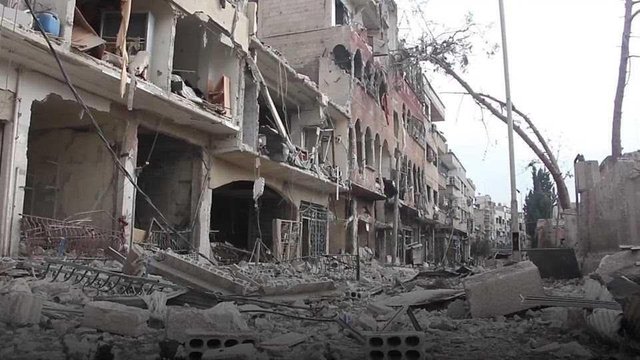
Russia's President Vladimir Putin has ordered a daily five-hour pause in the Syrian government's assault on the rebel-held Eastern Ghouta area.
It will start on Tuesday, and include the creation of a "humanitarian corridor" to allow civilians to leave.
The rebel enclave near Damascus, where 393,000 civilians are trapped, has been under intense bombardment by government forces with Russian support.
More than 560 people have been killed in eight days, a monitoring group says.
Russian Defence Minister Sergei Shoigu made the announcement about the "humanitarian pause", saying it would run from 09:00 until 14:00 local time (07:00-12:00 GMT) daily.
In a further statement, the ministry said the Syrian Red Crescent would help set up the corridor and people would receive information about it via leaflets, text messages and videos.
Life in Eastern Ghouta - read residents' stories
Syria conflict: Will powers end up in direct war?
Why is there a war in Syria?
Is this the same as the UN's truce call?
No. A UN Security Council resolution passed on Saturday demanded that "all parties cease hostilities without delay for at least 30 consecutive days" to allow humanitarian aid deliveries and medical evacuations of critically ill people.
UN Secretary-General Antonio Guterres said on Monday that the resolution needed to be implemented immediately, warning: "Eastern Ghouta cannot wait. It's high time to stop this hell on Earth."
But Russian Foreign Minister Sergei Lavrov told reporters that the UN-mandated truce would "start when all sides of the conflict agree on how to introduce it".
Map showing control of the Eastern Ghouta (19 February 2017)
He said the jihadist groups Islamic State (IS) and al-Qaeda would be excluded, as well as the major Islamist rebel factions Ahrar al-Sham and Jaysh al-Islam.
Mr Lavrov called them "partners of al-Nusra Front" - the name of a former al-Qaeda affiliate whose latest incarnation is an alliance of jihadists called Hayat Tahrir al-Sham (HTS). It has a small presence in the Eastern Ghouta.
Presentational grey line
What is the significance of Russia's move?
By Jeremy Bowen, Middle East editor, BBC News
If it works, President Putin's announcement of a daily humanitarian truce is the best news the hard-pressed people in the Eastern Ghouta have had since the bombardment intensified more than a week ago. However, it is not the full implementation of the UN Security Council resolution.
That resolution was weakened by the compromises necessary to stop it being vetoed by the Russians, who are Syrian President Assad's most essential allies.
No start date was agreed for the ceasefire demanded by the resolution. Instead, it used the wording "without delay". That leaves a lot of scope for Russia to impose conditions to buy more time for attacks on armed opposition groups.
Operations against the jihadists of IS and al-Qaeda are excluded from the resolution. But Moscow also says it will continue to hit Jaysh al-Islam. It is by far the most powerful opposition group in the Eastern Ghouta, is backed by Saudi Arabia, and has been to the Geneva peace talks. Jaysh al-Islam has accepted the ceasefire, while reserving the right of self-defence.
Russia and the Syrian government regard all the opposition groups as terrorists.
Presentational grey line
What is happening now in the Eastern Ghouta?
The Syrian Observatory for Human Rights, a UK-based monitoring group, says 36 people have been killed in the enclave since the UN resolution was passed at the weekend.
On Monday, 22 people were killed in air and artillery strikes on the towns of Douma and Harasta, it reported.
Rawaa has been living in a basement with around 75 others for months
Image caption Rawaa has been living in a basement with around 75 others for months
The Syria Civil Defence, a rescue organisation whose volunteers operate in rebel-held areas, said nine civilians had been killed in a strike on one building in Douma.
The official Sana news agency meanwhile cited police as saying a civilian had been injured in the government-controlled Qassa area of Damascus by shells fired by Eastern Ghouta rebels.
Government health official Zaher Hajjo told Reuters news agency that rebel shellfire had caused 36 deaths and a number of injuries in the last four days.
Was there a chlorine attack on Sunday?
Ambulance drivers reported a chlorine smell following reported a large explosion in the town of al-Shifuniya at around 18:30 (16:30 GMT).
The opposition-run health directorate in the Eastern Ghouta said at least 18 people were treated after presenting symptoms consistent with exposure to a toxic chemical, including breathing difficulties, eye irritation and dizziness. One male infant died, while a four-month-old baby had to be put on a ventilator, it added.
None of the reports could be independently verified, and it was unclear whether the boy's death was related to exposure to a chemical or the initial explosion.
Mr Lavrov said "bogus stories" about the use of chlorine were a "provocation" intended to sabotage the UN resolution.
The Syrian government has repeatedly denied using chemical weapons.
However, experts from the UN and the Organisations for the Prohibition of Chemical Weapons say government forces used chlorine as a weapon at least three times between 2014 and 2015.
They are also confident that government forces used the nerve agent Sarin in an attack on a northern rebel-held town last April, killing more than 80 people.